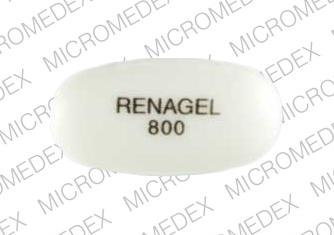Renagel Side Effects
Generic name: sevelamer
Medically reviewed by Drugs.com. Last updated on Feb 7, 2025.
Note: This document provides detailed information about Renagel Side Effects associated with sevelamer. Some dosage forms listed on this page may not apply specifically to the brand name Renagel.
Applies to sevelamer: oral powder for suspension, oral tablet.
Precautions
It is very important that your doctor check your progress at regular visits to make sure that this medicine is working properly. Blood tests may be needed to check for unwanted effects.
If your symptoms do not improve or if they get worse, call your doctor.
This medicine may cause serious stomach or bowel problems, including blockage, bleeding, ulcers, colitis (severe diarrhea), necrosis, or perforation (tear or hole). Check with your doctor right away if you have bloating, bloody, black, or tarry stools, constipation, diarrhea, fever, heartburn, indigestion, nausea and vomiting, stomach pain, cramping, burning, or tenderness, or vomiting of material that looks like coffee grounds.
Many people with kidney problems need to be on a special diet. To keep your kidney disease from getting worse, it is very important that you follow your special diet and take your medicines regularly, even if you are feeling better.
Common side effects of Renagel
Some side effects of sevelamer may occur that usually do not need medical attention. These side effects may go away during treatment as your body adjusts to the medicine. Also, your health care professional may be able to tell you about ways to prevent or reduce some of these side effects.
Check with your health care professional if any of the following side effects continue or are bothersome or if you have any questions about them:
More common side effects
- acid or sour stomach
- belching
- excess air or gas in the stomach or intestines
- full feeling
- passing gas
- stomach discomfort or upset
Serious side effects of Renagel
Along with its needed effects, sevelamer (the active ingredient contained in Renagel) may cause some unwanted effects. Although not all of these side effects may occur, if they do occur they may need medical attention.
Check with your doctor immediately if any of the following side effects occur while taking sevelamer:
Incidence not known
- bloating
- bloody, black, or tarry stools
- constipation
- diarrhea
- fast heartbeat
- fever
- heartburn
- hives, itching, rash
- hoarseness
- indigestion
- irritation
- joint pain, stiffness, or swelling
- nausea or vomiting
- redness of the skin
- stomach pain, cramping, burning, or tenderness
- swelling of the eyelids, face, lips, hands, or feet
- tightness in the chest
- troubled breathing or swallowing
- vomiting of material that looks like coffee grounds, severe and continuing
See also:
For healthcare professionals
Applies to sevelamer: oral capsule, oral powder for reconstitution, oral tablet.
General adverse events
The most frequently occurring adverse reactions included nausea, vomiting, diarrhea, dyspepsia, abdominal pain, flatulence, and constipation.[Ref]
Gastrointestinal
- Very common (10% or more): Vomiting (22%), nausea (20%), diarrhea (19%), dyspepsia (16%)
- Common (1% to 10%): Abdominal pain, flatulence, constipation, gastrointestinal reflux disease
- Frequency not reported: Dysphagia, diverticulitis
- Postmarketing reports: Fecal impaction, ileus, intestinal obstruction, intestinal perforation[Ref]
Gastrointestinal events are the most common adverse reactions reported with this drug. Based on studies of 8 to 52 weeks, the most common reason for drug withdrawal are gastrointestinal adverse reactions (3% to 16%).[Ref]
Immunologic
- Common (1% to 10%): Peritonitis[Ref]
A clinical study in patients receiving peritoneal dialysis (n=143) found the most frequently occurring treatment emergent serious adverse reaction was peritonitis. Peritonitis occurred in 8 patients receiving sevelamer and 2 patients on active control.[Ref]
Metabolic
- Common (1% to 10%): Anorexia
- Uncommon (0.1% to 1%): Acidosis, increased serum chloride levels, decreased carbon dioxide[Ref]
Hypersensitivity
- Postmarketing reports: Hypersensitivity[Ref]
Respiratory
- Very common (10% or more): Nasopharyngitis, bronchitis
- Common (1% to 10%): Cough, upper respiratory tract infection, dyspnea[Ref]
Dermatologic
Genitourinary
- Common (1% to 10%): Urinary tract infection[Ref]
Cardiovascular
- Common (1% to 10%): Hypertension[Ref]
Local
- Common (1% to 10%): Arteriovenous fistula site complication, arteriovenous fistula site hemorrhage, arteriovenous fistula thrombosis[Ref]
Nervous system
Other
- Common (1% to 10%): Fatigue, fever[Ref]
Musculoskeletal
- Common (1% to 10%): Arthralgia, muscle spasms, extremity pain[Ref]
References
1. (2001) "Product Information. Renagel (sevelamer)." Genzyme Corporation
2. Cerner Multum, Inc. "UK Summary of Product Characteristics."
3. Cerner Multum, Inc. "Australian Product Information."
4. (2009) "Product Information. Renvela (sevelamer)." Genzyme Corporation
More about Renagel (sevelamer)
- Check interactions
- Compare alternatives
- Reviews (1)
- Drug images
- Dosage information
- During pregnancy
- Generic availability
- Drug class: phosphate binders
- Breastfeeding
- En español
Patient resources
Other brands
Professional resources
Other brands
Related treatment guides
Further information
Renagel side effects can vary depending on the individual. Always consult your healthcare provider to ensure the information displayed on this page applies to your personal circumstances.
Note: Medication side effects may be underreported. If you are experiencing side effects that are not listed, submit a report to the FDA by following this guide.

